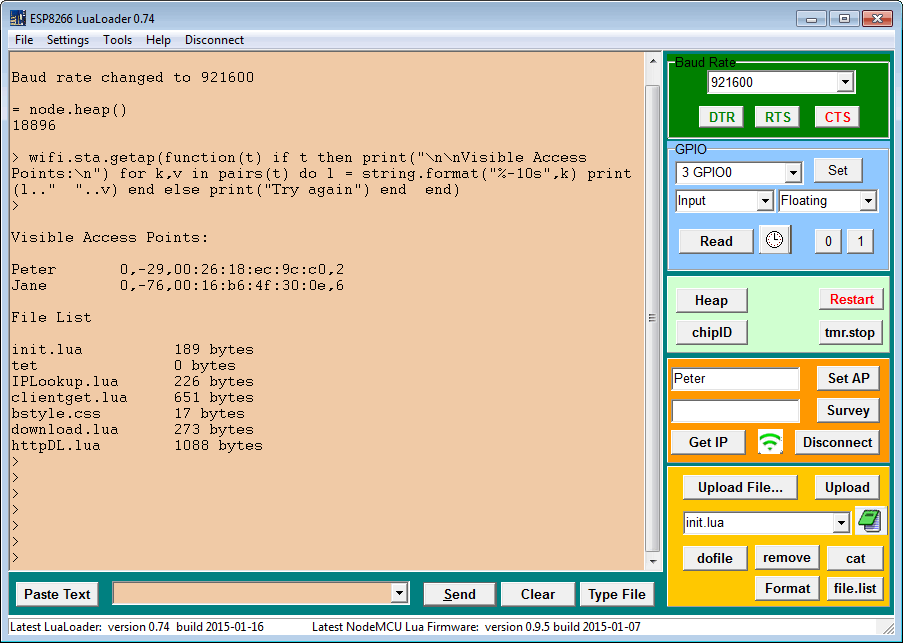Lua Read Write Serial Port

• Now wait until the driver generate on the server side, when it's finished the download link will be sent to your email. Flatron l177wsb driver windows 7 1. • Go to, put your name, email, and select 'ITM Touch, LG, USB' on the 'Touchscreen controller' drop menu then chose your OS Windows 7/8. • Download it then install 32 or 64bit setup, at first run the touch-monitor need to calibrate, so go to start menu->All program->UPDD->Calibrate.
Imagine you just want to send and read data through a serial port for testing purposes. The function 'Open' as well as 'Write' belong to the SerialPort object. I thought since I can write to it in the same way as I would write to a file that I could read it in the same way as I would read a file. But when I try to read it (using the code below) I just end up in an infinite loop.
Rs232 = require( 'luars232 ') -- Linux -- port_name = '/dev/ttyS0' -- (Open)BSD -- port_name = '/dev/cua00' -- Windows port_name = 'COM1 ' local out = io. Stderr -- open port local e, p = rs232.
Open(port_name) if e ~= rs232. RS232_ERR_NOERROR then -- handle error out: write( string.format( 'can't open serial port '%s', error: '%s' n ', port_name, rs232. Error_tostring(e))) return end -- set port settings assert(p: set_baud_rate(rs232. RS232_BAUD_115200) == rs232.
RS232_ERR_NOERROR) assert(p: set_data_bits(rs232. RS232_DATA_8) == rs232. RS232_ERR_NOERROR) assert(p: set_parity(rs232. RS232_PARITY_NONE) == rs232. RS232_ERR_NOERROR) assert(p: set_stop_bits(rs232. RS232_STOP_1) == rs232.
RS232_ERR_NOERROR) assert(p: set_flow_control(rs232. RS232_FLOW_OFF) == rs232. RS232_ERR_NOERROR) out: write( string.format( 'OK, port open with values '%s' n ', tostring(p))) -- read with timeout local read_len = 1 -- read one byte local timeout = 100 -- in miliseconds local err, data_read, size = p: read(read_len, timeout) assert(e == rs232. RS232_ERR_NOERROR) -- write without timeout err, len_written = p: write( 'test ') assert(e == rs232. RS232_ERR_NOERROR) -- write with timeout 100 msec err, len_written = p: write( 'test n ', timeout) assert(e == rs232. RS232_ERR_NOERROR) -- close assert(p: close() == rs232. RS232_ERR_NOERROR) • Copy lines • Copy permalink • Go.
Native ports class serial. Serial __init__ ( port=None, baudrate=9600, bytesize=EIGHTBITS, parity=PARITY_NONE, stopbits=STOPBITS_ONE, timeout=None, xonxoff=False, rtscts=False, write_timeout=None, dsrdtr=False, inter_byte_timeout=None, exclusive=None ) Parameters: • port – Device name or None. • baudrate () – Baud rate such as 9600 or 115200 etc. • bytesize – Number of data bits. Possible values:,,, • parity – Enable parity checking.
Possible values:,,, • stopbits – Number of stop bits. Possible values:,, • timeout () – Set a read timeout value.
• xonxoff () – Enable software flow control. • rtscts () – Enable hardware (RTS/CTS) flow control. • dsrdtr () – Enable hardware (DSR/DTR) flow control. • write_timeout () – Set a write timeout value.
• inter_byte_timeout () – Inter-character timeout, None to disable (default). • exclusive () – Set exclusive access mode (POSIX only). A port cannot be opened in exclusive access mode if it is already open in exclusive access mode.
Raises: • – Will be raised when parameter are out of range, e.g. Baud rate, data bits. • – In case the device can not be found or can not be configured. The port is immediately opened on object creation, when a port is given. It is not opened when port is None and a successive call to is required.
Port is a device name: depending on operating system. /dev/ttyUSB0 on GNU/Linux or COM3 on Windows. The parameter baudrate can be one of the standard values: 50, 75, 110, 134, 150, 200, 300, 600, 1200, 1800, 2400, 4800, 9600, 19200, 38400, 57600, 115200. These are well supported on all platforms.
Standard values above 115200, such as: 230400, 460800, 500000, 576000, 921600, 1000000, 1152000, 1500000, 2000000, 2500000, 3000000, 3500000, 4000000 also work on many platforms and devices. Non-standard values are also supported on some platforms (GNU/Linux, MAC OSX >= Tiger, Windows). Though, even on these platforms some serial ports may reject non-standard values. Possible values for the parameter timeout which controls the behavior of: • timeout = None: wait forever / until requested number of bytes are received • timeout = 0: non-blocking mode, return immediately in any case, returning zero or more, up to the requested number of bytes • timeout = x: set timeout to x seconds (float allowed) returns immediately when the requested number of bytes are available, otherwise wait until the timeout expires and return all bytes that were received until then. Is blocking by default, unless write_timeout is set. For possible values refer to the list for timeout above. Note that enabling both flow control methods ( xonxoff and rtscts) together may not be supported.